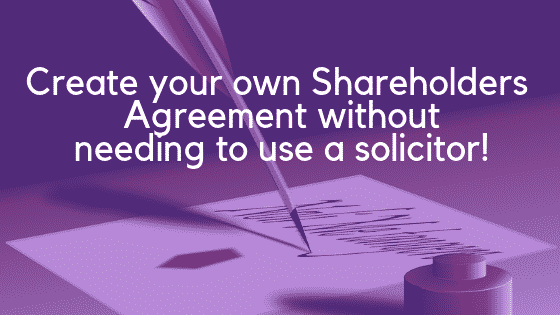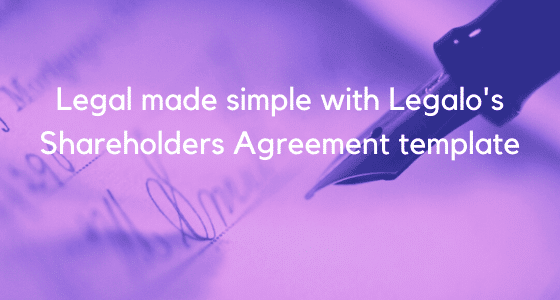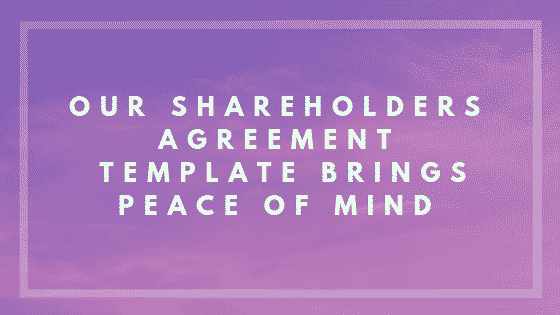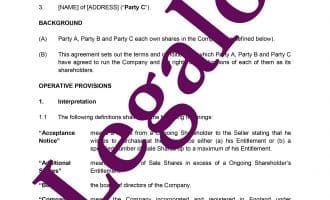Shareholders Agreement
Our Shareholders Agreement template:
- Over 100 sold!
- Drafted by an expert UK solicitor for reliability
- Full guidance notes included for easy drafting
- Suitable for any private limited company in the UK
- Includes our no quibbles satisfaction guarantee

How Does It Work?
-
1. Download
-
2. Edit
-
3. Print
-
4. Sign
This template Shareholders Agreement is great for use in the UK by:
- the owners of a private limited company that has been incorporated in England and Wales; and
- owners of a private limited company that has been incorporated in Scotland.
This is one of our best-selling templates, with over 100 sold!
A shareholder agreement sets out the rights and duties of each shareholder. It is an essential contract to put in place when a company has more than one shareholder. Whether you have a start-up or an older company, this agreement is a document that will provide peace of mind once it is in place.

Why do I need a Shareholders Agreement?
The purpose of a shareholders agreement is to cover key issues in a business relationship, for example:
- setting out how the shareholders will run the company;
- how to resolve a dispute between shareholders;
- how the company and its shares are valued; and
- what is to happen if a shareholder dies.
Our template deals with all of these issues. Putting in place a written agreement between the shareholders helps to ensure the smooth running of the company. Shareholders agreements greatly reduce the risk of a shareholders’ dispute occurring in the first place. If a dispute does occur, then with a proper agreement in place, it will be much quicker to resolve. It also becomes far cheaper and less stressful to resolve, as the agreement includes a watertight mechanism to sort this out. So you save on legal costs, stress and wasted management time by using a good shareholders agreement.
It is a key document for shareholders in any business, but particularly great for small businesses or start-ups, due to its bargain price. Both majority and minority shareholders benefit from the comprehensive protection provided by a suitable agreement. It also works really well when the shareholders hold equal numbers of shares, e.g. 50/50 or 33/33/33, 25/25/25/25, etc, but you can also use it when there are not equal shareholdings, e.g. 75/25, 60/40, etc.
If you are still in any doubt over whether you need this agreement, please click on this link to our separate blog article that explains the need for one. Wikipedia also has a helpful article on what such agreements commonly cover: read it here. Call our free helpline now on 0333 355 4900 if you are still not sure.
Why use our template?
David drafted this document. He is our co-founding, experienced company and commercial solicitor. You get a template that you can rely on to be both comprehensive and free of legal jargon. David is an expert in shareholders agreements and has drafted many of these agreements for past clients. He has also dealt with resolving many shareholder disputes, so knows well how to prevent shareholder disputes arising. He brings all of this experience to bear in creating a great legal contract for you at a very low cost. As a contrast, using a solicitors’ firm to draft a customised agreement for you would cost in the region of £2,000 plus VAT normally.
The template agreement is simple to complete. We include detailed guide notes to walk you through every clause in the shareholders agreement. You can view a sample or abbreviated version of the guidance notes here. It covers all of the standard areas one would expect such an agreement to cover.
What is included in the download?
Included in the download when you buy this template are:
- Shareholders Agreement for use when you have 2 shareholders; and
- Shareholders Agreement for use when you have more than 2 shareholders.
So you can simply pick and use the version you need. Each comes with its own guide to help you complete it. The guide walks you through the agreement clause-by-clause, so it is much more than just a checklist of the matters to include. You will know what the purpose of each clause is and how to fill it in, by deleting options that do not apply and filling in small details.
We have not adapted most of our drafts specifically for use in Scotland. However, this one has, so you can use it for a company that is registered in Scotland, as well as one registered in England and Wales.
How To Draft Your Agreement
Download this shareholders agreement in Word format. It is not available as a PDF as it will be much easier to edit in Word format. Once downloaded, edit it to your requirements.
The download includes great guidance notes. They take you through each clause in the agreement for absolute clarity. This makes completing the final agreement simple for you. As an example, you should allow for around an hour to complete the document.
The agreement is 14 pages in length. It provides robust protection for all shareholders, whilst remaining clear and simple to complete.

FAQs on a Shareholders Agreement
Below, we have answered the top questions from the Internet on this topic.
What is a shareholders agreement?
A shareholders’ agreement outlines the rights, responsibilities, and obligations of shareholders in a company. This legally binding document addresses matters such as ownership percentages, voting rights, dispute resolution, and the transfer of shares, helping to ensure clarity and fairness among shareholders with the added ability to be customised to meet the specific needs of the company and its investors.
Is a shareholders agreement legally binding?
A shareholders agreement is a legally binding contract voluntarily entered into by the shareholders of a company, and it is enforceable under the law, with violations having the potential to lead to lawsuits or injunctions. It serves as an important tool for regulating the relationship and rights of shareholders within a company.
Should I have a shareholders agreement?
It is highly advisable to have a shareholders agreement when a situation to do so arises. You can help to prevent disputes by:
- clarifying the rights and obligations of shareholders;
- setting mechanisms for conflict resolution; and
- addressing important issues like ownership transfers and decision-making processes.
It is the best way to provide legal protection and dispute resolution for the company and its shareholders, helping to protect the value of the shares.
What are the benefits of a shareholders agreement?
A shareholders’ agreement offers several benefits:
- The contract can help to resolve disputes among shareholders.
- It defines ownership percentages, rights, and responsibilities.
- It helps to safeguard minority shareholders and protects the company’s interests.
- It provides the ability to regulate decision-making processes and management.
- It clarifies procedures for share transfers and sale of the company if this situation were to arise in the future.
- It can include confidentiality clauses to protect sensitive information.
- It promotes long-term stability and continuity for the business.
- It ensures compliance with company law and shareholder agreements.
What happens without a shareholders agreement?
Without a shareholders’ agreement the rights, responsibilities, and ownership percentages for each shareholder may be unclear, leading to possible disputes or costly legal battles. Minority shareholders will end up with limited protection, the company may lack a structured process for making key decisions, transfer of ownership may come with extra challenges, and confidentiality regarding sensitive information may not be as safe. All of this can lead to Increased risk of instability and conflicts within the company, as well as legal gaps that can potentially expose the company to risks.
Does a shareholders agreement need to be in writing?
In order to be legally enforceable, a shareholders agreement needs to be in writing. While oral agreements can have some legal validity, written agreements are strongly recommended to ensure clarity, provide evidence of the agreed terms, and minimise disputes. A written document is also better suited to protecting the rights and ownership of shareholders.
What should a shareholders agreement include? What are the standard clauses in a shareholders agreement?
A standard shareholders’ agreement should include clauses addressing:
- Details on the types of shares and their ownership distribution.
- Procedures for voting, board composition, and management.
- Conditions for selling or transferring shares.
- Mechanisms for resolving conflicts.
- Shareholders’ rights, responsibilities, and restrictions.
- Procedures for selling the company or buying out shareholders.
- Protection of sensitive company information.
- Pre-emptive Rights: Shareholders’ rights to purchase additional shares that the company might issue, or to purchase shares that other shareholders are selling.
What are the key issues in a shareholders agreement?
Key issues in a shareholders’ agreement include:
- Ownership and Voting
- Management and Decision-Making
- Transfer of Shares
- Dispute Resolution
- Exit Strategies
- Confidentiality
- Pre-emptive Rights
- Restrictions
How do you structure a shareholders agreement?
When writing this sort of agreement, begin with an introductory section stating the agreement’s purpose and parties involved. Once you move on to the main text of the agreement, be sure to include:
- Information on share ownership, share classes, and initial ownership percentages;
- Details on voting rights, decision-making processes, and management roles, e.g. rights to appoint directors, any veto rights, any minority-shareholder protection provisions;
- Share transfer mechanisms, including compulsory transfer situations and how you would value shares if there is no agreement on a price;
- Clarity on dispute resolution procedures;
- All exit strategies, such as buy-sell provisions and sale of the company;
- Confidentiality clauses; and
- Non-compete agreements where appropriate.
Review and revise the agreement as necessary, ensuring it remains up-to-date and legally compliant, as well as customising any additional clauses to your individual agreement.
Who drafts a shareholders agreement? Do I need a lawyer to draft a shareholders agreement?
A shareholders’ agreement is typically drafted by a lawyer or a legal professional with expertise in corporate law, but this is not a necessity. The Legalo shareholders agreement template is drafted by experienced solicitors and just needs the addition of your and your company’s information. Your resulting agreement will be legally binding and will address all relevant and necessary issues that must be detailed in it.
Who are the parties to a shareholders agreement?
The parties to a shareholders’ agreement can include:
- Shareholders: Individuals or bodies who own shares in the company. This is the important bit.
- The Company: The business vehicle that has issued the shares. However, this is optional.
- Directors and Officers: Those responsible for managing the company. This is also optional.
What happens if a party breaches the shareholders agreement?
If a party breaches a shareholders’ agreement, consequences may include legal action, damages payments or penalties, remedy actions such as share buyouts, or termination of the agreement or removal from the board. The specific consequences depend on the terms outlined in the agreement and applicable laws, so can be different depending on the agreement. Is is important to include a mechanism to resolve disputes and breaches in your shareholders agreement.
Does a shareholders agreement need to be witnessed? Who can witness a shareholders agreement?
In the UK, a shareholders’ agreement does not typically require witnesses for validity. However if you are having witnesses, then witnesses can be any individuals who are:
- adults: and
- not party to the agreement, such as colleagues, neighbours, employees, friends, or legal professionals.
How much does it cost to draft a shareholder agreement?
The cost of drafting a shareholders’ agreement can vary significantly depending mainly on complexity. Complex agreements, especially those involving lawyers for customization and legal advice, can range from hundreds to thousands of pounds or more, but with a Legalo template you can ensure that your agreement will be legally binding and comprehensive for just £44.95.
Does a shareholders agreement need to be signed by all shareholders?
The main aim is for all, or a significant majority of, shareholders to sign the shareholders’ agreement, so that the mechanisms for the transfer of shares and resolution of disputes apply to all the key shareholders. If there are any shareholders that have not signed the agreement, then you may also need suitable Articles of Association with share transfer provisions in them, so that they are all bound by the important share transfer clauses. You would follow this method if you had a few employee shareholders, perhaps while using an employee share option scheme.
What are alternatives to a shareholders agreement?
Alternative mechanisms include:
- Articles of Association in which you change the company’s constitution to address share transfer rules, etc.
- A Consortium Joint Venture Agreement can be used where there is no company involved.
- Partnership Agreements can be used in specific cases in place of a shareholders agreement, but only if the business is a partnership and not a company.
- Trust Deeds can be used to manage and govern shares as between one shareholder and their nominee, but their scope is very limited and do not usually address share transfer issues.
However, these alternatives may have significant problems in addressing all the complexities of shareholder relationships when compared to a well-drafted shareholders’ agreement.
Are directors bound by shareholders agreement?
Yes, a shareholders’ agreement can sometimes bind directors if:
- they are also shareholders and have signed the contract in their capacity as shareholders; or
- individual shareholders appointed a director and therefore the directors is under the shareholder’s control.
However, they have separate obligations and statutory duties under company law that could affect their actions, even if the agreement specifies certain rights or restrictions. It’s important to ensure that the shareholders’ agreement and company’s articles of association are consistent and compliant with relevant legal requirements to avoid conflicts or legal issues.


